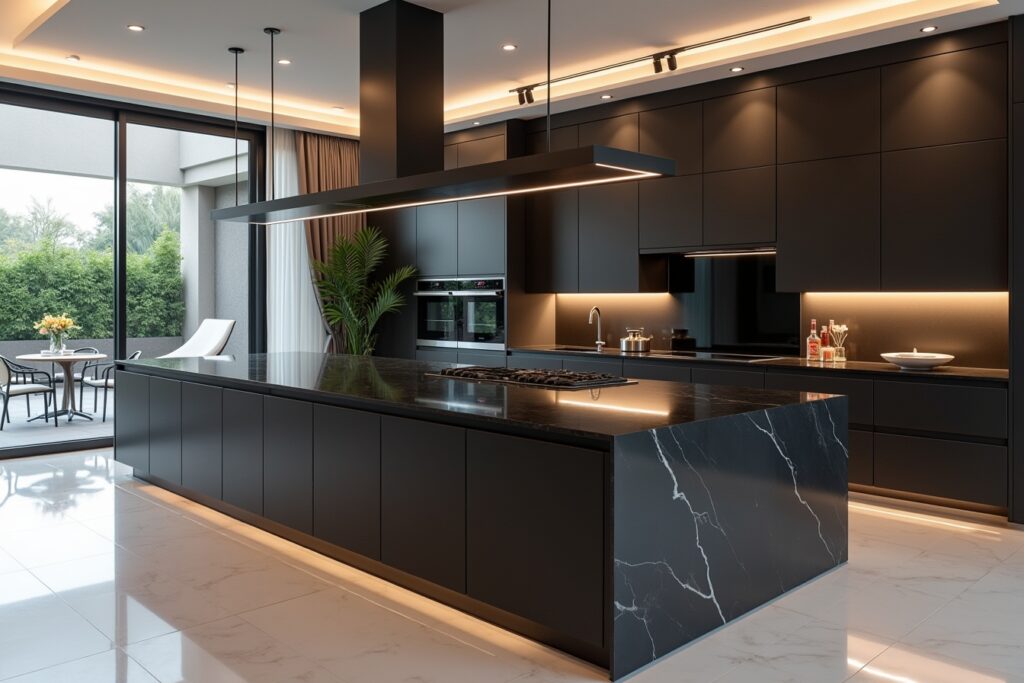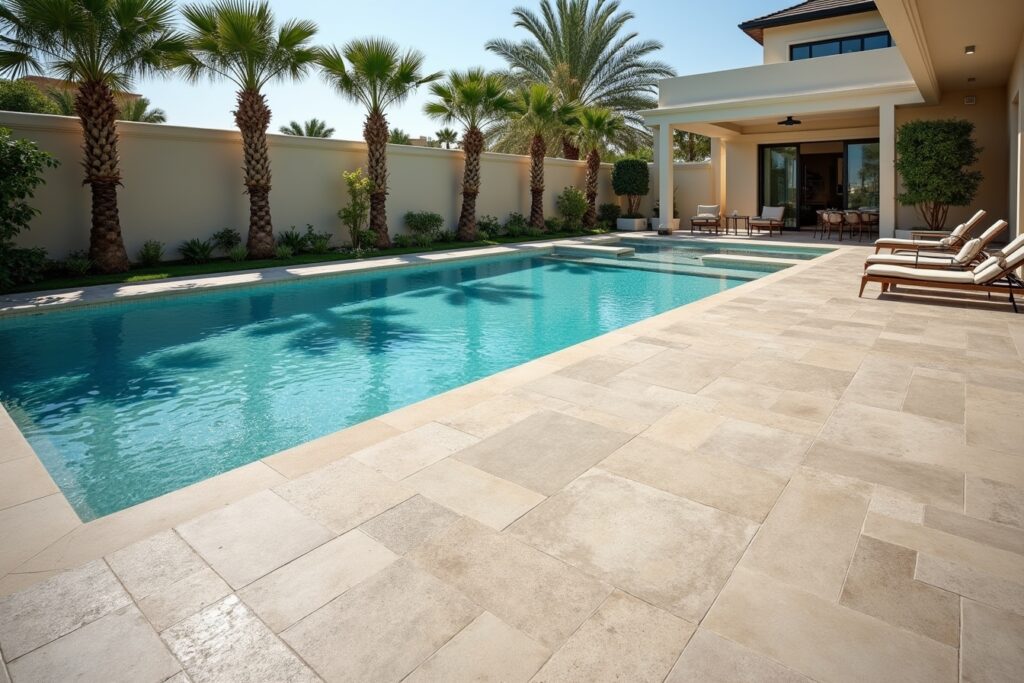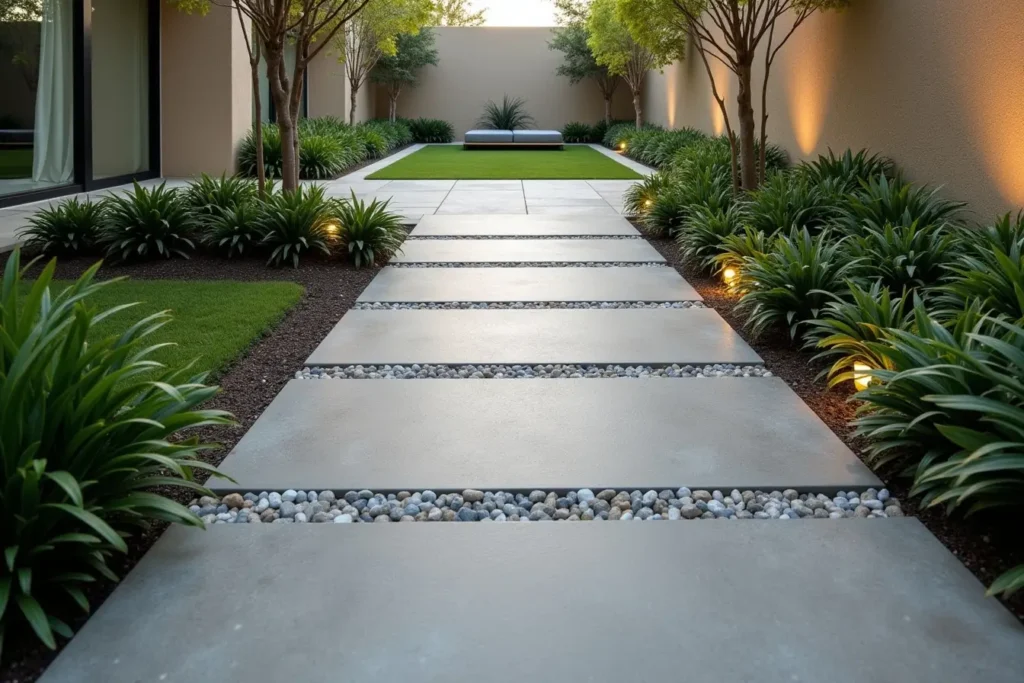How to choose the correct surface material, finish, and tile size for every space in your Dubai home?
Choosing the correct material for your floors, walls, countertops or outdoor spaces isn’t just about appearance.
In a climate like Dubai’s — with high temperatures, strong sunlight, dust, and regular water use in areas like bathrooms and gardens — it’s important to select surfaces that are practical, long-lasting, and safe.
This guide will help you understand the different types of surface materials, finishes, tile sizes, and textures available in the local market, and how to match them to your space and lifestyle.
Types of surface materials available in Dubai

Understanding your options is the first step. Here’s a breakdown of popular surface materials used in Dubai homes, and where they’re best applied:
- Porcelain – Durable, stain- and heat-resistant. Available in large slab sizes.
- Quartz – Engineered stone. Non-porous and consistent. Ideal for kitchens.
- Quartzite – Natural, harder than granite. Elegant, but premium-priced.
- Concrete – Modern and customisable. Needs sealing.
- Stainless Steel – Hygienic, heatproof, often used in professional-style kitchens.
- Travertine – Earthy, naturally textured. Suits outdoor areas.
- Marble – Elegant and natural but needs regular care.
- Granite – Tough and heat-resistant. Great for worktops and paving.
- Neolith (Sintered Stone) – Ultra-durable. Resists UV, heat, scratches — perfect for indoor and outdoor use.
Choosing the correct finish: polished, matt or semi-polished

Your material’s finishing affects not just the look, but also how safe or practical it is.
Finish
Best for
Description
Polished
Matt
Semi-Polished
Walls, vanity tops, feature panels
Floors, kitchens, bathrooms
Splash backs, cladding
Reflective, sleek, can be slippery when wet
Low-glare, better grip, modern look
Slightly glossy, soft texture, subtle shine
For bathrooms, kitchens, and pool areas, matt or non-slip finishes are safer and more suitable.
Tile sizes, shapes and layouts: why they matter
Tiles today come in a wide variety of formats. Here’s how to choose the right one for your space:
- Standard sizes: 60×60, 60×120, 80×80, 120×240 mm
- Shapes: Rectangles, hexagons, planks, mosaics
- Larger tiles: Create a clean, spacious look with fewer grout lines
- Smaller tiles: Ideal for wet rooms, curved walls, or decorative accents
In smaller Dubai apartments or bathrooms, large-format tiles can make the room feel bigger and more seamless.
Tile thickness: what’s right for each area?

The thickness of your tile or slab depends on where it’s being used:
Application
Ideal thickness
Notes
Indoor Floors
Wall Cladding
Kitchen Worktops
Bathroom Walls
Outdoor Paving
Feature Walls
9–12 mm
6–10 mm
20–30 mm (Quartz, Granite)
6–8 mm
20 mm+
Any, based on visual effect
Suitable for daily traffic
Lightweight, easier to handle
Durable, supports heavy use
Thin, neat installation
Needs strength and slip resistance
Can be ultra-thin if decorative
Texture and non-slip surfaces: safety and style
Texture matters, especially in wet or outdoor spaces:
- Smooth surfaces: Good for walls or dry indoor zones
- Textured / raked tiles: Safer in wet zones like pools, gardens, showers
- Anti-slip ratings
(R10–R13):
- R10: Basic indoor use
- R11: Bathrooms and kitchens
- R12–R13: Gardens, pools, outdoor terraces
In Dubai’s dusty and humid climate, anti-slip outdoor tiles are essential near pools, BBQ zones, and stairs.

Indoor vs Outdoor use: key differences
Outdoor surfaces need more than just strength — they also face sun, water, and weather extremes
Feature
Indoor use
Outdoor use
Sunlight
Water & Heat
Staining
Appearance
Not always a factor
Consider splash zones
Quartz and porcelain hold up well
More freedom of choice
Needs UV-stable surfaces (Neolith, Granite)
Use non-slip, heat-resistant options
Avoid marble unless sealed regularly
Stick with light colours to reduce heat
Tip: For pool areas, always choose anti-slip tiles specifically designed for wet outdoor conditions.
What to consider before you buy
Ask yourself:
- Will this surface be exposed to water or direct sun?
- Is the area used every day or occasionally?
- Do I want a low-maintenance option or am I fine with some upkeep?
- Does the tile finish match the look I want — and the safety I need?
It’s always a good idea to see material samples in person, test the texture, and confirm thickness and slip ratings with your supplier.
Quick material match guide
Area
Best Surface Materials
Kitchen Worktops
Bathroom Vanities
Indoor Flooring
Wall Cladding
Outdoor Pool Area
Garden Paths
Feature Walls
Quartz, Granite, Neolith
Quartz, Porcelain, Marble (sealed)
Porcelain, Matt Ceramic
Porcelain, Semi-polished Tiles
Textured Porcelain, Travertine, Neolith
Anti-slip Granite, Porcelain Pavers
Polished Porcelain, Marble, Concrete Look
Flooring styles & layouts: from classic to contemporary
Flooring isn’t just about the material — how it’s laid can dramatically change the look and feel of a space. Here’s a guide to popular flooring styles and arrangements, plus material options suitable for Dubai’s climate.
Popular flooring layouts:
Layout style
Description
Best for
Straight Lay
Plank Lay
Herringbone
Chevron
Versailles
Diagonal
Grid layout with square or rectangular
Long tiles or boards laid lengthwise
Rectangles set in zigzag pattern at 45°
Chevron layout with angled joints
Mixed layout in classic stone flooring
Laid at 45° to walls
Minimalist or modern homes
Open-plan spaces, bedrooms
Feature floors, hallways
High-end living and dining areas
Villas, classical interiors
Makes rooms feel wider
Tip: Herringbone and chevron styles work especially well with wood-looking porcelain or SPC planks for a designer effect that’s practical in Dubai’s dusty conditions.
Material options for flooring
✅ Porcelain Tiles
- Extremely durable and scratch-resistant
- Suitable for straight, plank, and herringbone layouts
- Available in wood-look and stone-look styles
✅ Travertine
- Natural stone with a textured, earthy finish
- Best laid in a Versailles pattern or traditional grid
- Requires sealing but works well for rustic or Mediterranean styles
✅ Solid Wood Flooring
- Timeless and elegant, especially in plank or herringbone
- Sensitive to Dubai’s humidity and temperature change
- Not recommended for kitchens, bathrooms, or outdoor use
✅ SPC (Stone Plastic Composite)
- Water-resistant, stable in temperature extremes
- Available in plank styles with click-lock installation
- Ideal for bedrooms, living rooms, even some bathrooms
✅ LVT (Luxury Vinyl Tile)
- Soft underfoot, scratch-resistant, and moisture-tolerant
- Easy to install and affordable
- Comes in tile or plank form for varied designs
Which style works best in Dubai?
Room
Recommended Layout & Material
Living Room
Entry or Hallway
Bedroom
Kitchen
Bathroom
Outdoor Patio
Plank (SPC, LVT, Porcelain)
Herringbone or Chevron (Wood-look porcelain)
Straight or Plank (LVT, SPC, Wood)
Straight (Porcelain, LVT)
Straight or diagonal (Porcelain)
Straight or Versailles (Travertine, Porcelain)
Final thoughts
Not all materials are created equal. Some are tough and low maintenance, others need sealing and care. The key is to match your material’s strengths to your space’s purpose — especially in Dubai’s demanding climate.
FAQ'S
What is the best surface material for kitchen worktops in Dubai?
Quartz is a popular choice because it’s durable, easy to clean, and resistant to stains. For outdoor kitchens, Neolith or granite are better due to UV and heat resistance.
Can I use porcelain tiles for kitchen counters or walls?
Yes. Large-format porcelain slabs are ideal for counters, splash backs, and wall cladding. They’re heat-resistant and available in thin, seamless formats.
Which tile finish is safest for bathrooms or pool areas?
Matt or textured finishes with anti-slip ratings (R11–R13) are best for wet areas like bathrooms, outdoor patios, or pool decks.
What’s the difference between quartz and quartzite?
Quartz is man-made, with a consistent pattern and no sealing needed. Quartzite is a natural stone, more durable but also more expensive and requires sealing.
Is marble a good option for bathrooms in Dubai?
Marble looks beautiful, but it’s porous and can stain easily. If used in a bathroom, it should be sealed properly and cleaned with non-acidic products.
What is Neolith and where should I use it?
Neolith is a type of sintered stone. It’s scratch-proof, stain-resistant, and UV-stable. It’s ideal for countertops, feature walls, facades, and outdoor use.
What tile thickness is suitable for outdoor floors?
Outdoor porcelain tiles should be at least 20mm thick to handle foot traffic and weather. Look for anti-slip surface textures as well.
Can I use polished tiles outdoors in Dubai?
No. Polished tiles are slippery when wet and not suitable for gardens or pool areas. Use matt or textured tiles with anti-slip features for outdoor safety.
Need help choosing the right surface material, tile size, or finishing for your project?
If you have any questions regarding flooring, wall tiles for your project – again if it’s for inside your home, the exterior of the property – cladding, your garden / landscaping or if it’s a commercial space then please get in touch.
I would be happy to help with any questions you may have, thank you.
Matt


